Mumbai 2nd-5th April
2nd April – Midnight
I’ve arrived in Mumbai for a 17 day food tour of Northern India and it’s the day before Good Friday. I’m staying three nights at The Taj Mahal Palace (as marvellously featured on the recent BBC documentary). Quite jet lagged when I wake up. Auto sight-seeing at breakfast takes the form of looking out of the window at the spectacular Gateway of India built by the British Raj in the Apollo Bunder area of South Mumbai overlooking the Arabian Sea at the edge of the harbour across the road.
Don’t get further than the pool all day, it’s 40 degrees.
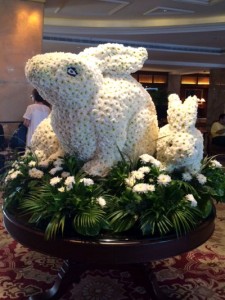
Easter Flower Rabbit, The Taj Mahal Palace
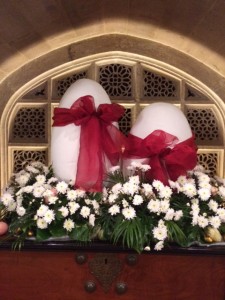
Easter Eggs, The Taj Mahal Palace
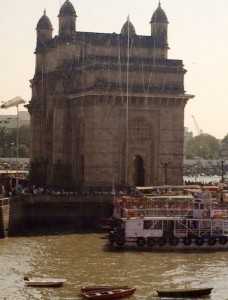
The Gateway to India, the view at breakfast on my first morning

The Taj Mahal swimming pool
3rd April – My first street food tour in India with Roxanne Bamboat; Twitter’s ‘The Tiny Taster’; all over the city are pockets of stalls that spring up in the evening selling Indian toasties and all manner of snacks, sugar cane juice, and a huge selection of different vegetarian foods at the Beach of Girgaon
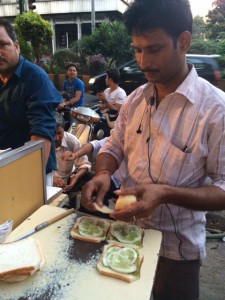
Toastie making by the side of the road
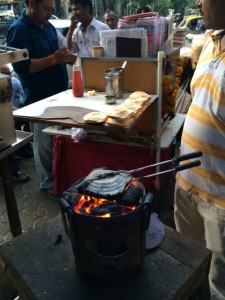
Charcoal toastie machine Indian style
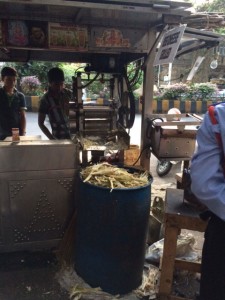
Sugar cane juice made to order
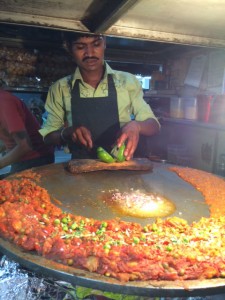
A kind of Chilli Chickpea Stew being cooked with such skill
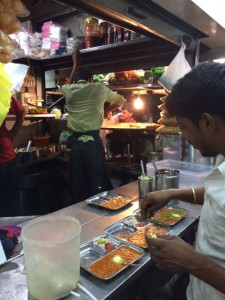
Chilli Chickpeas ‘en place’
4th April – 4am. I’m no longer filled with joy at staying at The Taj. Ice cold water is gushing out of the bath taps in my gorgeous bathroom and I’ve only 30 minutes to get ready to meet my guide Harsh Vardhan of No Footprints Mumbai who looked after Rick Stein when he was shooting his TV series in Mumbai. Bless these people, it’s all I can do to stop a stampede of hot water engineers beating a path to my door, I have quite a job to convince them to come back later.
Then we’re into the air conditioned car speeding along to the fish docks down the road in the inky black early morning, I’m eternally grateful the temperature is still only in the 20’s.
Photography is banned in the docks following the terrorist attacks a few years ago so for this bit you will just have to rely on my graphic descriptions of what happens next.
As soon as we park and I open the car door I have to slam it shut again. I’m gagging. The smell of the rotting remnants of so many fish auctions long gone by is beyond overpowering. Harsh says I will get used to it. I make a Blue Peter mask of layer upon layer of Boots Antibacterial wipes to hold over my mouth and nose but it barely makes any difference as we walk through the docks to the water’s edge.
The sight that meets me is completely magical. Giant boat upon boat fit together like a giant jigsaw puzzle, hemming each other in lit by strings of small lights looking very Christmassy. The decks are covered in mountainous piles of different fish, men crouch silently sorting the fish by hand, throwing each onto the correct pile, barely looking as they work. They know these fish so well by the feel of the shape and scales.
On the quay side the women silently wait in the early dawn, each sitting in a large plastic bucket, the size of which will contain only the 15kg of fish they are able to comfortably carry and ultimately sell when they return to their homes. They are beautifully dressed in brightly coloured saris, each outfit slowly comes to light as the dawn appears.
The silence of this is broken as the bowls of fish are thrown up from the boats to the quayside. The women are up in a flash and in no time all hell breaks loose with them shouting, pushing and kicking to get the right price for the fish they want. I feel I am in the midst of a human tsunami. It’s all very unladylike, fiercely competitive and outstandingly impressive.
As we walk back to the car Harsh compliments me on my ankle high pillar box red wellies. I had been warned of what lies underfoot in the markets and streets in India and I remain ever thankful to Sandra Ziles for suggesting sensible footwear. A pair of plastic overshoe covers would have lasted all of five minutes in the slush of fish beneath me.
Next on our logistics tour of the city is to see the arrival of the chickens.
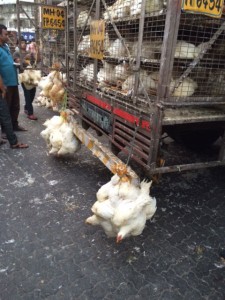
The arrival of the chickens
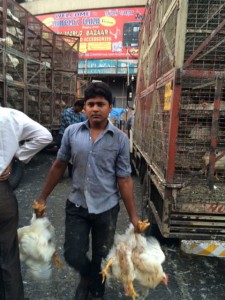
Chickens being delivered live to the butcher’s shops
(there is one on nearly every street)
There is no chill chain in India. Everything is eaten fresh. If you want a chicken you call your butcher, there is one on nearly every street and he will chop the head off one and deliver it warm. That’s not what we are used to but that’s the way it’s always been in India. I don’t have too much of an issue with it as all chicken are well looked after or the butcher’s reputation will suffer accordingly but I do have an issue with the fact they consequently don’t hold them for tenderness. Chicken in India is a very tough affair indeed best slow cooked.
Next the veg market brimming with the kind of quality we in the UK rarely get to see. Gleaming, shiny, Magpie bright coloured veg in all shapes and sizes. It’s no wonder 80% of the Indian population are vegetarian with choice like this.
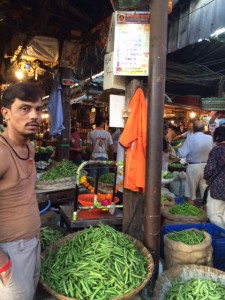
The Green Bean Man and his bags of beans
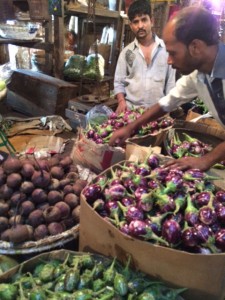
The Aubergines, so shiny you can see reflections in them
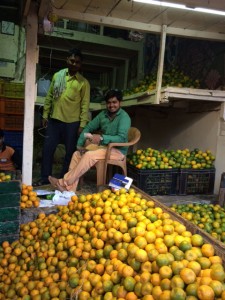
King of the Oranges, no wonder he is smiling
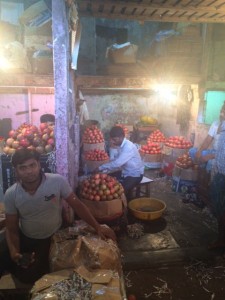
Every tomato is a juicy one
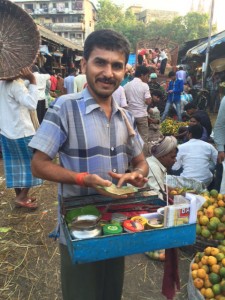
The Betal Leaf Man, one of these little packets will aid digestion and freshen your breath
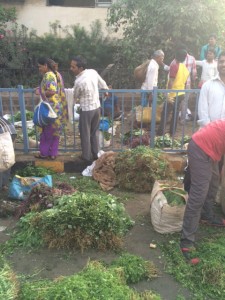
The Herb Market
Before we set off to a special lunch cooked by Harsh’s mother we fit in the Chilli Market. Ladies bring their families’ recipes often handed down through the generations for mixing, roasting and grinding into powder which is done while they sit on the street across the road in the shade waiting patiently.
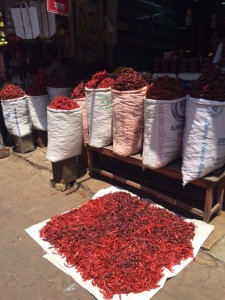
Chillies in the sun
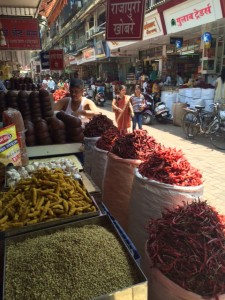
One of the many spice shops
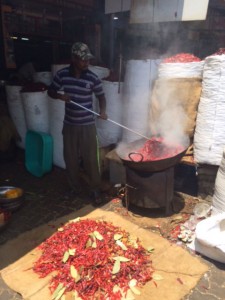
A recipe waiting to be roasted in the queue
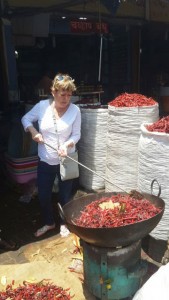
My eyes were streaming, I wasn’t very good at this, roasting is an art
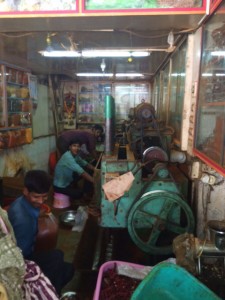
The grinders in action
By lunchtime it’s 40 degrees and we set off to lunch with Harsh’s family, cooked by his very talented mother. I didn’t think it right to take photographs of this very special occasion attended by many family members. It was a lovely lunch, with many personal recipes all delicious. If I am very honest I did however struggle (understatement) with Bombay Duck, or Bombil as it is called locally, one of Mumbai’s polarising culinary experiences. This misnamed delicacy is actually a fish whose pungent odour is very much part of Mumbai’s smell. It got its name from the days of the Raj when it was transported by the iconic train, the Bombay Daak, ‘daak’ being the Hindu word for mail. The name then bastardised to the word ‘duck’ which stuck. This very gelatinous wobbly boney incredibly strong fish was served to me deep fried. I seriously struggled to keep it down after just one mouthful. Being banned by the EU can only be a good thing in my opinion.
5th April – 6.30am – time to leave Mumbai and head to the airport to catch my flight to Delhi. I am rather overweight for a domestic flight (shockingly 10kg) which will hardly surprise those who know me well.
Note to self : repack hand luggage more sensibly on the return.
An unbelievably strong curry is served on the 45 minute flight which leaves an overpowering smell which fills and lingers nastily in the cabin. It proves extremely popular with all passengers except me.
Second note to self : wash hair as soon as humanly possible on arrival at The Imperial Hotel, Delhi.
